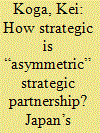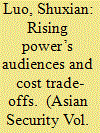|
|
|
Sort Order |
|
|
|
Items / Page
|
|
|
|
|
|
|
| Srl | Item |
| 1 |
ID:
188210


|
|
|
|
|
| Summary/Abstract |
As global warming accelerates the melting of Arctic ice, opportunities for new transport routes open along with new strategic interests. This article examines how China pursues its interests in the Arctic and, specifically, the degree to which it seeks to work through the existing regime complex versus engaging in bilateral cooperation with Arctic states. China’s willingness to work through the regime complex or use bilateral cooperation depend on the specific issue. We find that China relies on global regimes regarding navigation issues, prefers bilateral cooperation for purposes of resource extraction, and prioritizes Arctic regimes to justify the pursuit of dual-use scientific research. We conclude that as a great power, China is well-positioned to use institutional complexity to its advantage. China uses existing regimes when it benefits Chinese interests, supplemented by bilateral initiatives as appropriate.
|
|
|
|
|
|
|
|
|
|
|
|
|
|
|
|
| 2 |
ID:
188207


|
|
|
|
|
| Summary/Abstract |
How do domestic politics affect the management of alliances? Contra Snyder (1984), I argue that states’ alliance management strategies do not arise solely in response to the external threat environment but rather differing perceptions of it by party leaders. I illustrate my argument through a plausibility probe of the U.S.-South Korean military alliance, demonstrating how South Korean leaders’ partisan interpretations of the threat environment affected intra-alliance bargaining in the coordination of military affairs. Consistent with the framework developed here, I find that partisan differences do a better job explaining alliance dynamics over the past quarter century than systemic factors alone.
|
|
|
|
|
|
|
|
|
|
|
|
|
|
|
|
| 3 |
ID:
188209


|
|
|
|
|
| Summary/Abstract |
China is pursuing a “gray zone” strategy to advance its maritime claims in the East and South China Seas. That is, it is gradually expanding its control and influence over disputed maritime space by leveraging nontraditional tools of sea power—its coast guard and maritime militia—backed up by the People’s Liberation Army Navy (PLAN). Each of these forces plays a role in this strategy, but roles overlap and are mutually-supporting. Thus, the effectiveness of this strategy depends in part on the ability of the coast guard, navy, and militia to synergize their efforts. This article examines China’s efforts to improve jointness between the China Coast Guard (CCG) and the PLAN. In particular, it assesses recent developments in operational coordination, joint training and exercises, and intelligence sharing. It argues that despite widespread recognition in China of the importance of the CCG-PLAN relationship, the two services still fall short in all three areas.
|
|
|
|
|
|
|
|
|
|
|
|
|
|
|
|
| 4 |
ID:
188206


|
|
|
|
|
| Summary/Abstract |
I argue that the asymmetric strategic partnership (ASP) between a regional great power and a small power is not necessarily based on their shared goals, but such a partnership would help them achieve their own strategic objectives. For a regional great power, an ASP helps prevent a weak partner from excessively depending on a rival state for its economy and security. For a small power, the partnership increases the legitimacy of domestic political regime while offering a strategic option to hedge against the risk of over-dependence on a particular state by diversifying political and economic assistance. In short, ASPs serve as a wedge strategy for a regional great power, while it functions as a hedging strategy for a smaller power. I apply this conceptual framework to analyze two cases, the Japan-Cambodia and Japan-Laos strategic partnerships.
|
|
|
|
|
|
|
|
|
|
|
|
|
|
|
|
| 5 |
ID:
188208


|
|
|
|
|
| Summary/Abstract |
Observers characterize China’s behavior in the South China Sea in the recent decade as a continuity of assertiveness, coercion, or delay. Yet, even within a pattern of continuity, China’s way of handling interstate crises arising from its maritime territorial claims has varied from case to case, vacillating between escalation that prioritizes “safeguarding sovereign rights” (weiquan) and deescalation that puts an emphasis on “maintaining stability” on its periphery (weiwen). How can we explain this variation? In this article, I develop a framework, the audience cost trade-off hypothesis, to explain when and why China is likely to escalate or deescalate in maritime disputes. I argue that when deciding whether to escalate, Chinese decision makers usually weigh and make a trade-off between their anticipated domestic political costs should they back down and their potential international costs should they take an escalatory stance. I illustrate the framework with a case study of two major interstate crises in the South China Sea: the 2012 China-Philippine standoff in the Scarborough Shoal and the 2014 Sino-Vietnamese clash over the deployment of the oil drilling platform HYSY-981.
|
|
|
|
|
|
|
|
|
|
|
|
|
|
|
|
|
|
|
|
|